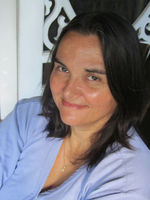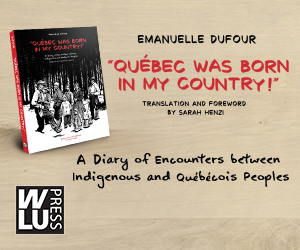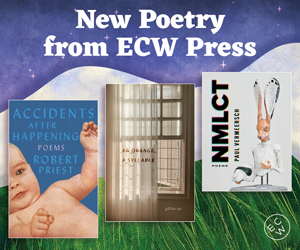The In Character Interview, with Philippa Dowding
Philippa Dowding's wildly creative, wonderfully strange stories are the kind of books that turn young readers into book lovers. With pages full of lovable misfits and regular kids caught up in otherworldly happenings, a new Philippa Dowding book is a cause for celebration.
So we're excited to celebrate Everton Miles is Stranger Than Me (Dundurn Press), the sequel to Dowding's charming The Strange Gift of Gwendolyn Golden, which was shortlisted for the OLA Red Maple Award. The story returns to Gwendolyn, an awkward teen and, somewhat more uniquely, a Night Flyer (which is pretty much what it sounds like). When Gwendolyn finds herself drawn to float over the same spot night after night the summer before starting high school, she soon finds that what is drawing her there is Everton Miles -- a fellow Night Flyer. The two kindred spirits are soon running (and floating) as fast as they can from threats magical, menacing and social.
We're happy to welcome Philppa to Open Book today to talk about Everton and Gwendolyn as part of our In Character interview. She tells us about the memorable antagonist of the new book (and his understandable tragic flaw), borrowing names from Neil Young, and what she has in common with her characters.
Open Book:
Tell us about the main character in your new book.
Philippa Dowding:
My new book, Everton Miles is Stranger than Me, is the sequel to The Strange Gift of Gwendolyn Golden (Dundurn, 2014), and has a few returning and a few new characters.
My hero, Gwendolyn Golden, apart from having the gift of flight, is starting grade nine. She’s a little older, a little wiser, she’s sticking a toe into the shallow end of adulthood. She’s indomitable, brave, darkly funny, but not terribly academic, and she’s got a strange new friend: the only other teenage Night Flyer in town, Everton Miles, who is both older and much cooler than her.
Pitted against these two mis-matched teenagers, is an antagonist who straddles both the regular life of the sleepy little town of Bass Creek and the magical world of the Night Flyers. He’s Abilith the Rogue, fallen Spirit Flyer. He’s immortal (although his clean cut brothers and sisters, the Spirit Flyers, can destroy him if they can catch him), an outcast, bitter, powerful, he’s a persuasive predator who bends the truth to his own needs. His tragic flaw? Centuries before, he fell in love with the wrong creature.
OB:
Some writers feel characters take on a "life of their own" during the writing process. Do you agree with this, or is a writer always in control?
PD:
I think most writers will tell you that their favourite characters came to them in a flash of inspiration, or madness, then took on a life of their own during the writing of their story. That’s definitely how it is with me. I usually hear a character’s voice loud and clear right from the start, then let them take me wherever they want to go.
It’s the best part of being a writer, I think, following a character deeper and deeper into their story.
Your CanLit News
Subscribe to Open Book’s newsletter to get local book events, literary content, writing tips, and more in your inbox
OB:
How do you choose names for your characters?
PD:
For me, characters usually arrive with their own names pretty quickly. It’s not something I struggle with (I can’t say if this is a problem for anyone else, though). I can’t really say how it works, it’s kind of like falling upon the perfect balance of ingredients for a delicious stew, part luck and part inspiration.
I like alliteration, like Gwendolyn Golden or Christopher Canning (from The Gargoyle at the Gates), and slightly offbeat names, like Everton Miles. One of my gargoyles from the Lost Gargoyles Series was named Ambergine, a different spelling of Amber Jean, the name of Neil Young’s daughter. Another gargoyle was named Septimus, my grandfather’s middle name.
However a name arrives though, it sticks with the character and it’s hard to change after that. I changed a character’s name once at the publisher’s request because they felt it was too unusual. That character never felt quite right after that, however they might have been right. It was a pretty weird name!
OB:
What is your approach to crafting dialogue, particularly for your main character? Do you have any tips about writing dialogue for aspiring and emerging writers?
PD:
Dialogue comes in two main forms for me: fast and furious during the first write, when the action is being set down for the first time, then it is very carefully re-crafted and (mostly) cut, in the second and subsequent edits.
My advice would be don’t edit the dialogue too much in your first draft. Just write, don’t stop yourself or worry too much about the exact wording, or exactly how each character responds to action. Just get them there, living and breathing in the story … then go back and examine each and every word of dialogue in rewrites. I think that’s where a writer’s expertise really lies anyway, in the editing process.
Also, everyone says this but it’s true: first drafts are universally terrible, and read your dialogue aloud to cut out the extraneous or weird stuff no one would ever say.
OB:
Do you have anything in common with your main character? What parts of yourself do you see in him or her, and what is particularly different?
PD:
Gwen hangs out with her best friend, Jez (who isn’t a Night Flyer), she goes to high school, she babysits her little brother and sister, she has homework. She’s a pretty average teenager, except for being stalked by Abilith the Rogue, and the whole flying-around-the-town-at-night thing. Gwen has a dark secret, yes, but eventually she discovers she’s part of a larger community of Night Flyers like her.
In high school, I was a bit like Gwen. I was pretty quiet, reserved even, the only slightly unusual thing about me (if anyone asked), might be that I spent a lot of time playing guitar in the stairwell behind the auditorium stage with a few other sensitive souls. But I had a dark secret: I wrote. A lot. It’s not something I shared with anyone, although as I got older, I found out about the poetry club.
Gwen and I are like most teenagers, I think. We feel like outsiders with a dark secret, whatever that might be, until we discover, through some mysterious combination of maturity and good luck, that we aren’t alone.
OB:
Who are some of the most memorable characters you've come across as a reader?
PD:
This list could be a lot longer, and changes all the time, but a few standouts …
As a kid, my favourite characters were Mr. Tumnus, Bilbo, and Charlotte. In university, I was entranced by the modernity of Jane Austen’s heroines, particularly Elizabeth Bennett. I also liked Nathaniel Hawthorne’s women, Hester Prynne and Hepzibah Pyncheon, probably for the same reason. In science fiction, Arthur C. Clarke’s chilling Karellen, the mysterious alien in Childhood’s End, stands out.
I’d pick Neil Gaiman’s Silas, from The Graveyard Book, as a memorable character from modern children’s literature, being a vampire with a heart of gold. And because I like a good tragic flaw as much as the next person, a current memorable adult character is Cormoran Strike, Robert Galbraith/J.K. Rowling’s flawed detective, an Afghan vet with a missing leg, and a brilliant mind.
OB:
What are you working on now?
PD:
I’m adding two more books to my middle-grade horror series, Weird Stories Gone Wrong. Plus, I’m polishing up my first piece of realistic fiction, a YA story about an unusual friendship on the waters of Lake Ontario. I’m learning a lot about mallard ducks!
____________________________________________
Philippa Dowding is an award-winning copywriter, poet, and children’s author. Her books have been nominated for the Diamond Willow, Hackmatack, Silver Birch, and Red Maple awards. Her third book, The Gargoyle at the Gates, was named a White Raven Book by the International Youth Library in Munich. Philippa lives in Toronto.



